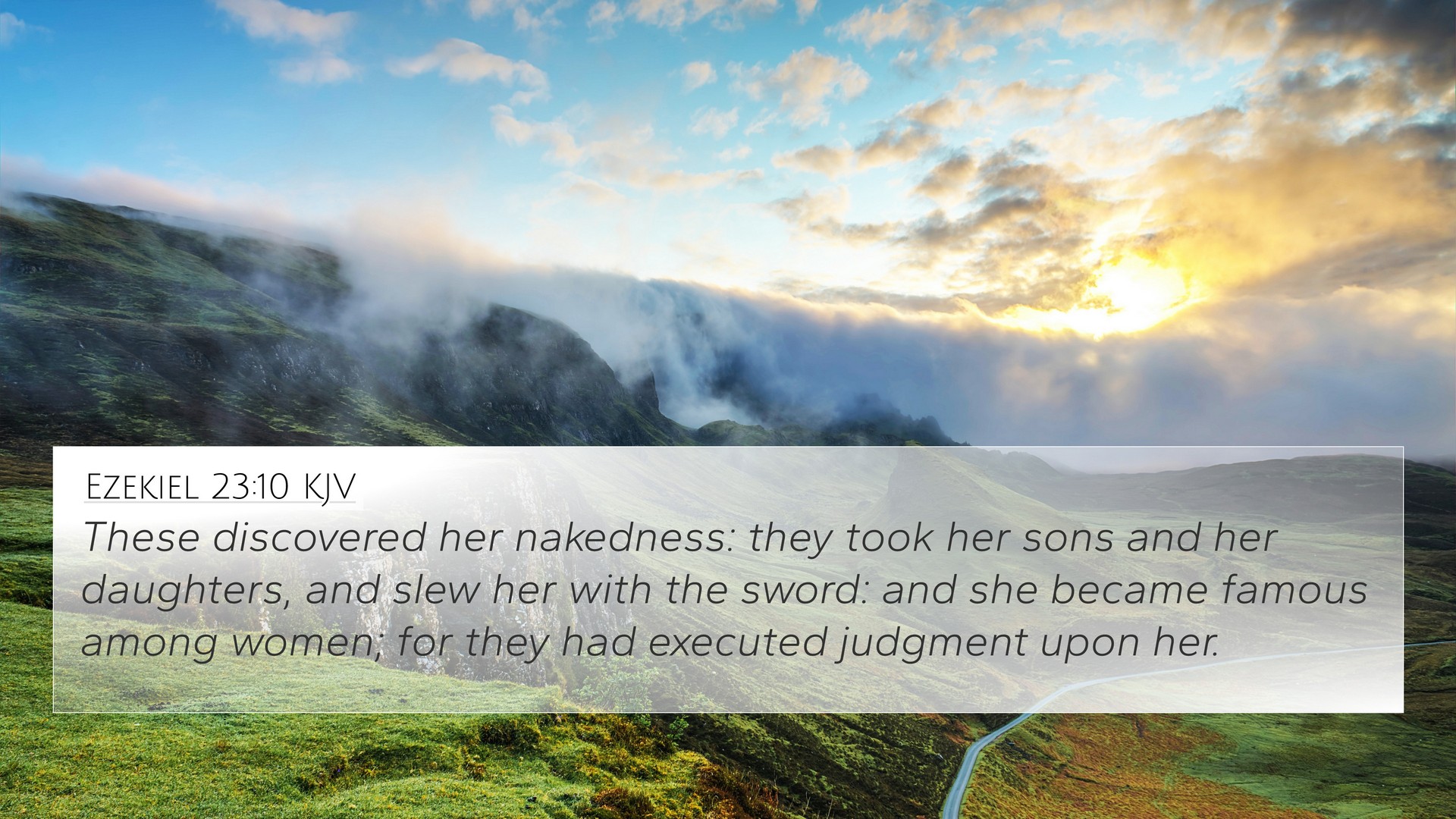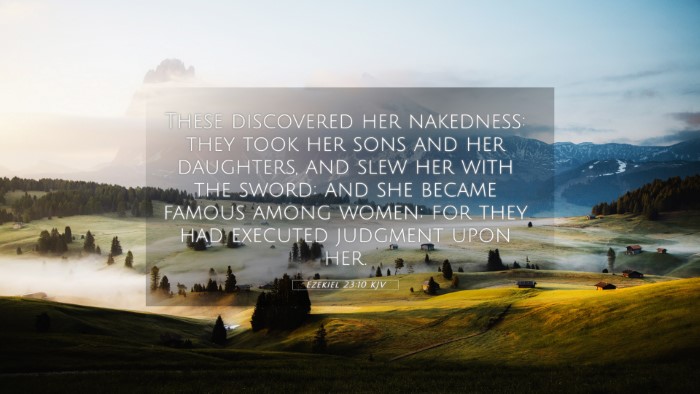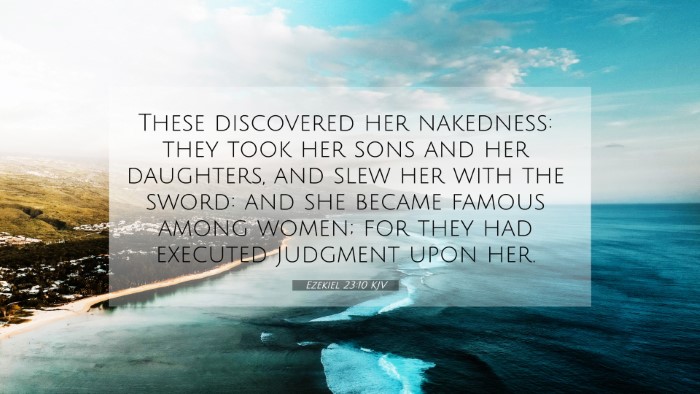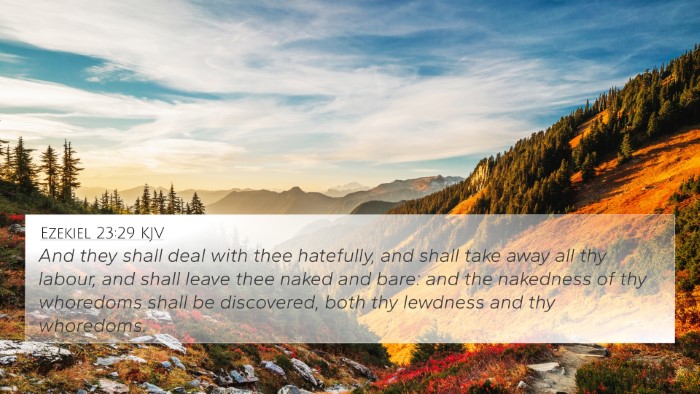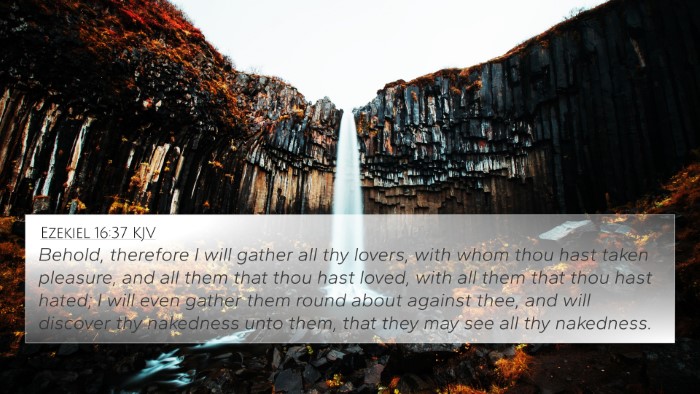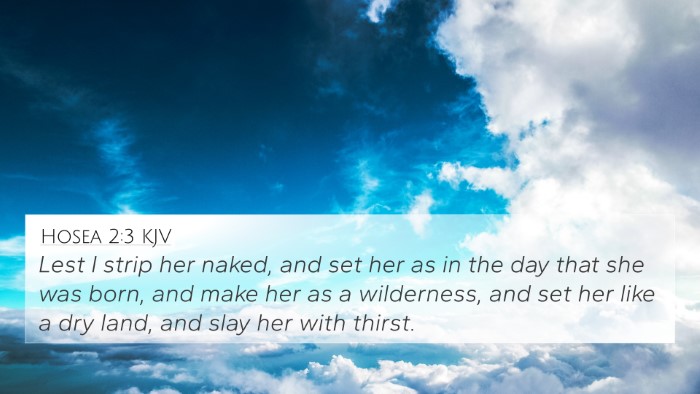Ezekiel 23:10 - Summary and Interpretation
Ezekiel 23:10 reads: "These uncovered her nakedness; they took her sons and her daughters, and slew her with the sword: and she became famous among women; for they had executed judgment upon her." This verse occurs in the context of a prophetic allegory, where God uses the metaphor of two sisters, Oholah and Oholibah, to portray the sinful acts of Samaria and Jerusalem.
Understanding the Context
The metaphor employed throughout Ezekiel 23 illustrates the infidelity of Israel. The two sisters represent the two kingdoms: Israel (Oholah) and Judah (Oholibah). Matthew Henry points out that these sisters symbolize the spiritual unfaithfulness and moral corruption that lead to their downfall. This exploration provides a deep understanding of God's judgment against those who turn away from Him.
Commentary Insights
- Matthew Henry: He emphasizes that the fall of these nations reflects the consequences of abandoning God's covenant. Their 'nakedness' symbolizes their exposure and humiliation due to their sins, and the violence they endure illustrates the severe punishment for idolatry.
- Albert Barnes: Barnes further elaborates on how the fierce judgment executed upon these nations serves not only as a warning to Israel and Judah but also as a reminder of divine justice. The 'sword' signifies the physical destruction wrought by the enemy, reminding the faithful of the importance of righteousness.
- Adam Clarke: Clarke's analysis delves into the deeper implications of the alliances formed by Oholah and Oholibah with foreign nations. These alliances represent their betrayal of God, portraying a broader narrative of disobedience and the repercussions that follow.
Cross-References and Thematic Connections
This verse is rich in connections to other scriptures, highlighting themes of judgment, infidelity, and the consequences of sin. Here are some pertinent Bible cross-references:
- Jeremiah 3:6-9: Discusses the unfaithfulness of Israel, paralleling the themes in Ezekiel 23.
- Hosea 2:2: Similarly addresses the issues of adultery in spiritual terms, reinforcing God's stance on faithfulness.
- Isaiah 1:21: Critiques Jerusalem as a harlot, linking to the same narrative of betrayal found in Ezekiel.
- Revelation 18:2: The call to "come out of her" resonates with the themes of judgment against the corrupt city, echoing the warnings in Ezekiel.
- Psalm 78:59-64: Reflects God's anger against His people for their unfaithfulness, a common thread in the prophetic literature.
- Ezekiel 16:35-43: An earlier passage that shares a similar allegorical portrayal of Jerusalem's unfaithfulness.
- Amos 2:4-5: Offers a diatribe against Israel, which resonates with the repercussions of their sins as stated in Ezekiel.
The Importance of Cross-Referencing Biblical Texts
Utilizing cross-referencing tools allows individuals to delve deeper into the connections between scripture, enhancing comprehension and providing clarity. Below are methods and resources for effective cross-referencing:
- Bible Concordance: An essential tool for identifying themes and connections across the Bible.
- Bible Cross-reference Guide: Guides that outline thematic links between different verses for enhanced understanding.
- Cross-reference Bible Study: Methods for studying the Bible through its interconnectedness to enrich one's faith experience.
- Identifying Connections: Encourages readers to explore how Old and New Testament verses correspond, especially in theological themes.
- Detailed Cross-reference Between Gospels: A resourceful approach for discerning the parallels between the accounts of Christ.
- Linking Biblical Prophecies: A method for comparing prophetic messages that resonate across different books.
Conclusion: The Lesson from Ezekiel 23:10
The vivid imagery and prophetic declarations found in Ezekiel 23:10 serve as a powerful reminder of the consequences of spiritual infidelity. The judgments faced by Israel and Judah illustrate the vital importance of fidelity to God and the dire repercussions of turning away from His commandments. This verse, along with its cross-references, offers profound insights and guidance for contemporary readers seeking to understand the depth and implications of their covenant with God.
